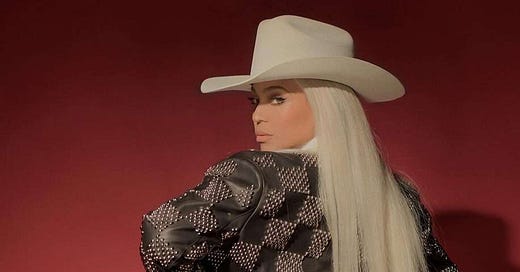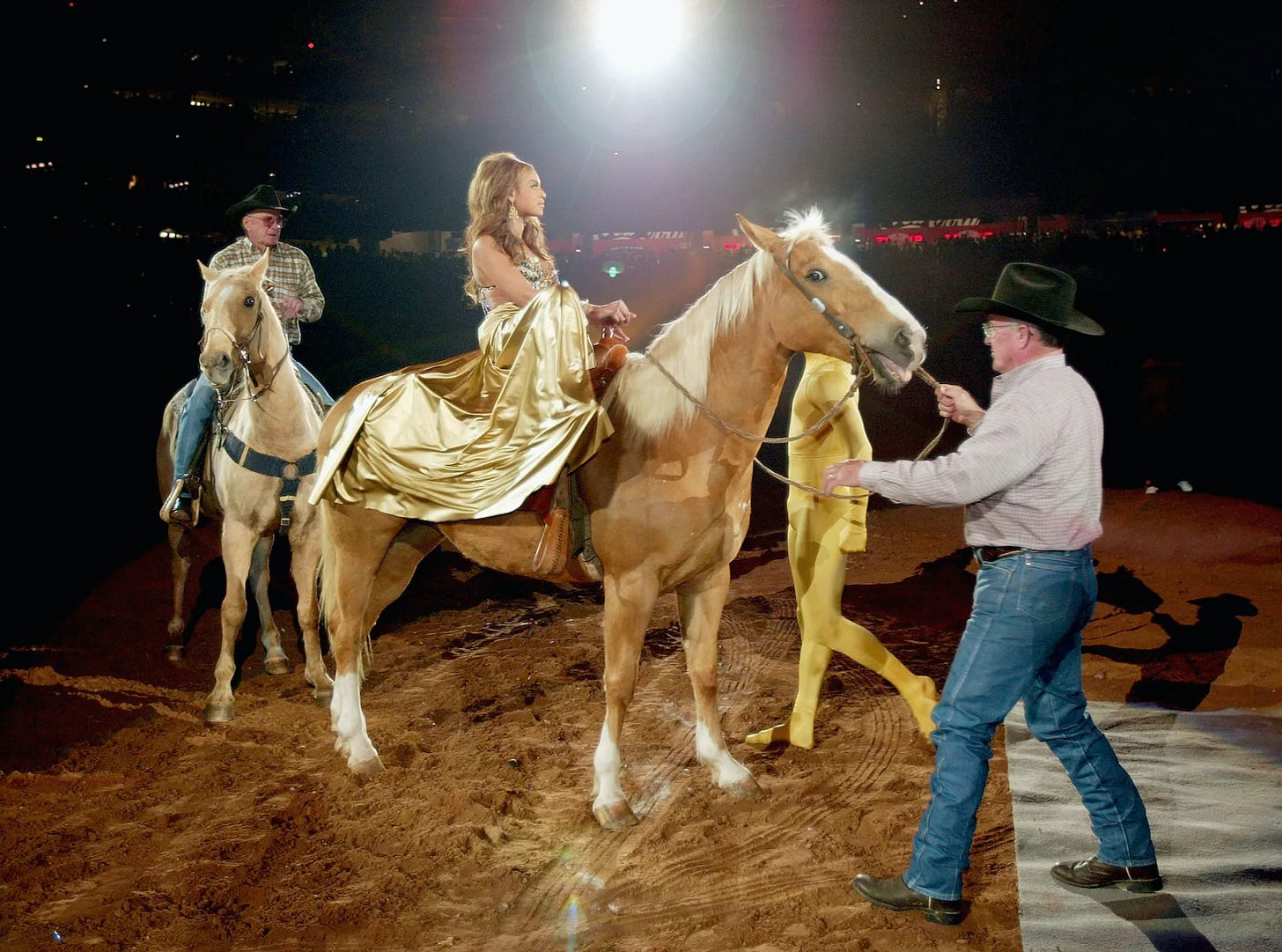By Marissa
You may have heard by now that Beyoncé is releasing a new album – Act II of her Renaissance trilogy, which appears to be country (evidence being: having ears and eyes). I suppose that technically it was announced last night, during a Verizon Superbowl commercial, but really, she told the world her plans in November of 2016, on stage at the CMA Awards with The Chicks. Flanked by the genre’s most notorious “outlaws” - if you want to get into a real workable meaning of this word, and not the authenticity fetish version, The Chicks qualify over truly any famous straight white man who ever existed – Beyoncé gave us the song title of her first official country single: “TEXAS.” It’s the first word of “Daddy Lessons,” the country murder ballad on Lemonade, and the first word she said up there on the CMA stage, in front of an audience full of plenty of people who bore fewer proper country bonafides than the queen herself (Beyoncé has been wearing a cowboy hat since early Destiny’s Child days, when your fav bro country adult was listening to Smashmouth and wearing a trucker cap or whatever). Her new song, featuring the brilliant Rhiannon Giddens on banjo and viola, “Texas Hold ‘Em,” feels like an exact continuation of that moment. The supposed purists in that audience who turned their noses at Beyoncé and The Chicks (or, worse, walked out, cough cough Alan Jackson cough cough) were never going to hold her down, because the genre of country music was built on the banjo necks plucked by Black musicians. And Beyoncé isn’t going to let you forget that, yee fucking haw.
The same folks who will tell you a group of white guys basically playing rock music is country (please: I can list at least ten) will tell you that “Daddy Lessons” was most definitely not. The Recording Academy rejected it from inclusion into country categories that year, perhaps because the idea of having Beyoncé snatch the title away from white country singers (on labels whose execs make up the voting body) who “paid dues” in the genre was too much for them to bear. I had been thinking about this moment a lot recently, with Luke Combs and his cover of “Fast Car” (here’s where I do the stupid caveat of saying I think he handled the entire trajectory of this wonderfully, I am a Luke fan, glad we put that on record). I think about how the only way Music Row will embrace a Black woman in the genre is if they come filtered first through the lens of an already approved white man – and even then, it’s usually still not enough. I wonder what would have happened if Beyoncé chose not to collaborate with The Chicks on the CMA’s but a Standard White Male Country star: of course, Beyoncé never would have, anyway. The master’s tools with never dismantle the master’s house, and she rode into town on her own glowing silver horse (and many, many horses before that, because she is from TEXAS.)
The funny thing about that year – and probably any year in recent memory – is that Beyoncé is as much of an influence on most current country superstars as Alan Jackson, if not more so. Maren Morris, who won New Artist of the Year that same show, grew up singing songs like “Halo” in Texas dancehalls. That was also the year that Maren sung “My Church” during the broadcast - alongside the McCrary Sisters and the Preservation Hall Jazz Band. That willingness to reconnect with the Black roots of the genre is so Bey-coded, it’s amazing it landed on the same night at The Chicks collab. Even onetime CMA co-host Carrie Underwood could credit her bombastic balladry in part to Beyoncé – the threads of modern music are all interconnected, however we try to bury them.
As I have said before, it doesn’t capture the full picture to just blame conservative-fueled racism for maintaining the white status quo, or for keeping the Black roots of country music minimized. White liberals have done their share of damage, too: by keeping country music sequestered not just by what they view as taste, but by class. It is a lesser artform, a “I like anything but country” refrain. If country music is beneath them, why would it ever be worth considering the true roots of the genre anyway? And yet, who are two of the biggest, most recognizable cultural icons, regardless of genre? Willie Nelson and Dolly Parton. Everyone likes country music. They might just be too concerned with what admitting it means. The idea of country music being only white and poor is manufactured anyway – read Elamin Abdelmahmoud for more on this.
“When a narrative is that clean,” Giddens told Abdelmahmoud, “somebody wrote it.” [Here is where I tell you to also follow every step of Holly G and Tanner at Black Opry, pay attention to the scores of Black country artists they share, and to read Black Country Music by Francesca Royster, if you haven’t and don’t already].
Most interesting to me? To see how Beyoncé can change the perception of country music, and how it is understood: not so much how Music Row views Beyoncé. She doesn’t need them.
“Texas Hold ‘Em” is a perfect country song for the moment. The inclusion of Giddens, whose life mission has been a full-scale historical reeducation on the Black roots of country music and country instrumentation, makes it revelatory (Giddens and Beyoncé, as Natalie just said in a conversation we were having about this, were both shut out of the Country Music/Music Row machine, for both different but very connected reasons!). The omissions – a Nashville producer, a Music Row co-writer – tell a story, too. Beyoncé didn’t need to build a country record with Nashville, because anything she could borrow they had already taken out on loan.
You can add three seconds of banjo to a white man’s record, and suddenly it’s country. I have a feeling there will be arguments and diatribes on why “Texas Hold ‘Em” and “16 Carriages” are not – we will hear a lot of the “just adding banjo doesn’t make it country.” The tell of that is they simply cannot register the Black ownership of the instrument in the first place. A white person holding it is authentic, while a Black person is show, signaling, fake.
I don’t know if country radio will place Beyoncé, and I don’t know if it matters. I am guessing they will not. Beyoncé, as writer and artist Karen Pittelman wrote in her essay, “Another Country,” is not just a Black woman, but a political Black woman. But I do know that “Texas Hold ‘Em” is as “country” than the bulk of the Billboard country chart last year – specifically the music of Jelly Roll and Morgan Wallen, which borrows heavily from Black tradition. Again, I don’t really think it matters. Shifting country radio is far less important than shifting the whole damn culture.
And it is also FUN. Like “Daddy Lessons” with the Chicks, and even “Old Town Road,” it’s fun. And for an industry that seems to pride itself on the party, they sure seem to let their bigotry and gatekeeping get in the way of a good time.
Anyway, the test is not if Music Row and the Nashville radio infrastructure accepts Beyoncé or not. I loved how Tressie McMillan Cottom put it on this video: Beyoncé isn’t trying to break into country music. She’s Beyoncé. This is a different sort of showdown. Draw your pistols: Daddy said, “shoot.”
The Outlaws vs. The Armadillos. Red Dirt vs. studio gloss. Texas has always been at war with Nashville. Now the battle is finally getting good.
Also! Don’t forget: tomorrow Lola Kirke is joining us on Zoom for Don’t Rock The Inbox Live! (!!) Mark your calendars for Tuesday, February 13th at 8 p.m. CT; the Zoom link will be sent to paying subscribers that morning, so make sure you’re subscribed before then so you don’t miss out on all the fun! As ever, the conversation will be available later as a podcast (for paying subscribers) and an edited Q&A (for everybody!).






Great Commentary!
Great kicker